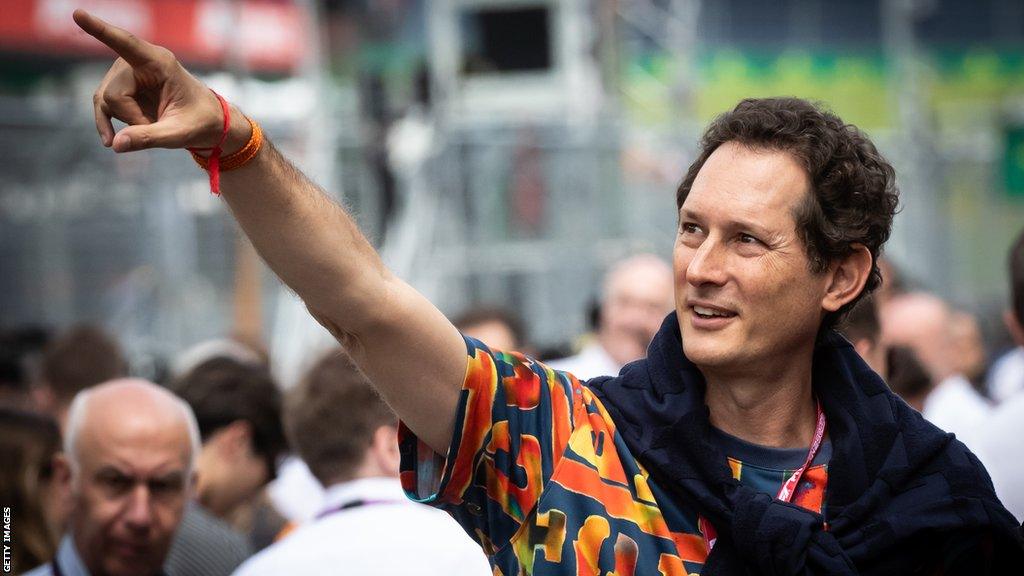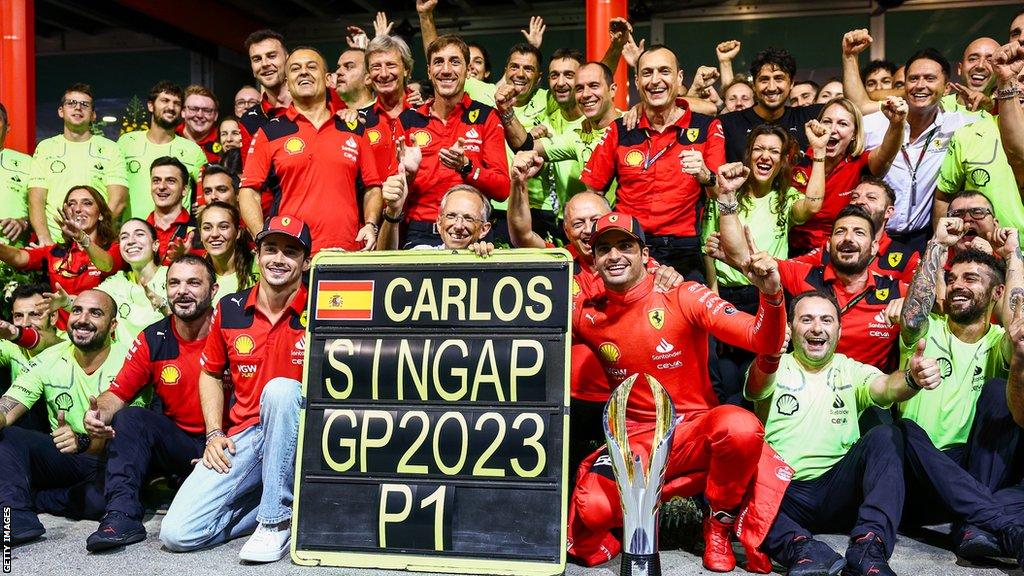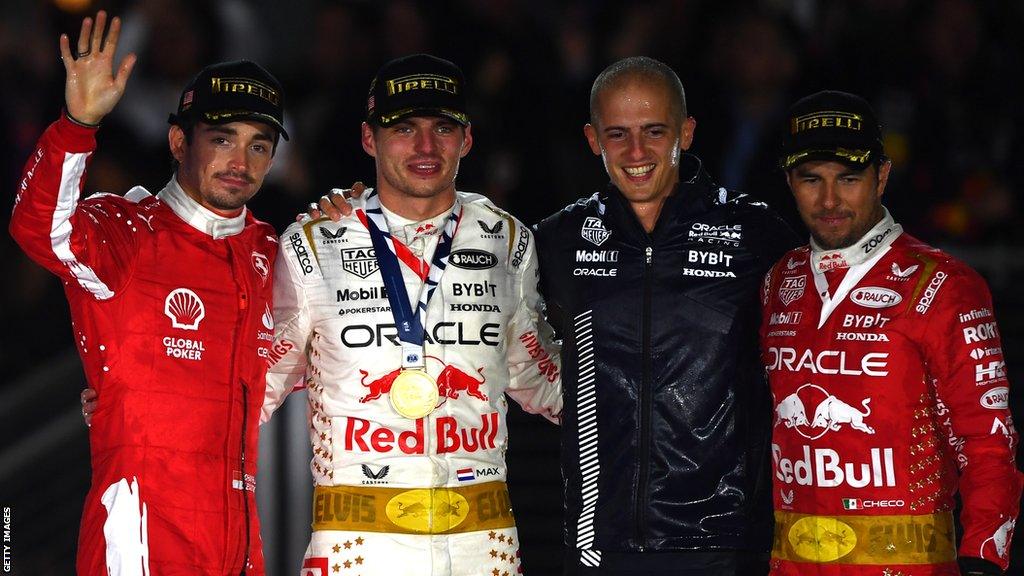Ferrari chairman John Elkann says team '100%' moving in right direction
- Published

John Elkann was appointed Ferrari chairman in July 2018
Ferrari chairman John Elkann says he "couldn't be happier" about the prospect of the team returning to the top in Formula 1 under Frederic Vasseur.
Elkann, who picked Vasseur to replace Mattia Binotto as team principal last year, says Ferrari are "100%" moving in the right direction, and he has "definitely" seen the positive change he was hoping for.
The team are "much tighter, much closer" under Vasseur, Elkann says, and "so many incredibly talented people want to come to Ferrari, and that's a very strong sign".
Appointed chairman of Ferrari in July 2018, Elkann rarely gives interviews of any kind, and when he does they tend to be about the corporate side of the Ferrari business. BBC Sport has been chosen exclusively for his first for more than a year about Ferrari in F1.
The interview - conducted at the Las Vegas Grand Prix last weekend - comes at the end of a difficult season for F1's most celebrated team.
Ferrari finished second in 2022, after a strong start was punctured by a series of operational errors and reliability failures, before the car fell from competitiveness.
Those failings were the final straw for Elkann when it came to Binotto, who had presided over a controversy about the legality of Ferrari's engine in 2019, and a 2020 which was the team's worst season in 40 years.
The trauma of 2020 clearly still haunts Elkann as he brings it up numerous times during the interview.
There was progress through 2021 and 2022, but Elkann still did not like what he was seeing.
"What's really important, and this is the thinking we had, is that accountability is really one of the biggest determinants in what our competitors have achieved well," he says. "And also nimbleness, despite their larger organisations.
"They tend to be nimbler, faster. And Fred had those attributes, having been working in motorsport all his professional life and having been very successful in different categories, but also in F1 having managed a smaller team [both Renault and Sauber/Alfa Romeo].
"So on one side he brings a culture of responsibility and accountability, but he also knows and has operated in organisations that are smaller, more effective and nimbler, and that is definitely something we were lacking compared to our stronger competitors."
The stats that prove progress
Vasseur did not start working at Maranello until January, so Ferrari started the season with a car bequeathed to them by choices made under Binotto's leadership last year.
They expected it to put them in a position to fight for the World Championship. So when they discovered that it was not only too slow, but also suffered from vicious handling that drivers Charles Leclerc and Carlos Sainz could not trust, it was a major disappointment.
There has been steady progress all year. Ferrari are the only team other than Red Bull to win a race - thanks to Sainz's victory in Singapore. And Leclerc might well have added another victory in Las Vegas but for the unfortunate timing of a second safety car.

Carlos Sainz (right of sign in front row) is fourth in the standings going into the final race of the season
Qualifying performance is another measure of Ferrari's development progress.
In the first half of the year, they were on average 0.275 seconds slower than Red Bull. In the second half of the year - over one lap, if definitely not in the race - the Ferrari has actually been quicker than the Red Bull, by 0.027secs. They have taken pole position at six of the past 10 races.
Elkann arrives at the interview armed with other statistics to prove Ferrari's progress in 2023.
In average points per race, they were scoring 15.7 in the first half of the year, against 20.5 in the second. That represents an increase of 30.5% - a figure beaten across the field only by McLaren, whose remarkable progress has been one of the stories of the season.
Elkann is also keen to mention Ferrari's victorious return to Le Mans this year, which he says was "very encouraging and invigorating" for the F1 operation.
The question of corporate interference
At the time Binotto was removed, there were those who criticised the decision, and felt the Swiss should have been given more time. It was painted in some quarters as the latest in a series of examples of Ferrari's corporate side meddling in the F1 team.
Many feel this has been one of Ferrari's biggest weaknesses - the single largest explanation as to why they have failed to compete with the likes of Red Bull and Mercedes over the past decade and a half.
The fact the team's most successful period - with Michael Schumacher from 2000-2004 - happened at a time when a strong management group led by team principal Jean Todt and technical director Ross Brawn kept chairman Luca di Montezemolo at arm's length is used as evidence.
Put this to Elkann and he says he "couldn't agree more" with the analysis of the reasons for success under Todt.
"We had a very clear-functioning organisation when he was leading it and the reality is that we are one company and we feel very proud to be one company, which is something that particularly in the last years we have been trying to encourage," he says. "But that is also linked to having clear accountability and responsibility."
'The right culture just left us'
Elkann is essentially referring to what Mercedes call a "no-blame culture".
If you trace back," he says, "we haven't had that culture since Jean Todt and then Stefano [Domenicali, Todt's successor] were leading. It just left us.
"Accountability is that you own your responsibility and somehow a blame culture deflects that. So it's not about blaming, it's about being responsible. And that was a major cultural difference that we had.
"So if we look at 2020, I remember that there was such disappointment. That's when I realised we had to take this very seriously and it was important to look at what was happening and be aware of it and work.
"We were not going to be competitive until 2022 - and everyone was very much in denial about this. And then we actually were able to work over these years and be competitive in 2022.
"So focus definitely is an area where if it is applied, but then you need a culture that is able to use that focus in a way that pushes full responsibility and accountability and ultimately a no-blame culture is a prerequisite of it."
Why have Ferrari failed to win for so long?
Ferrari's last drivers' title was won by Kimi Raikkonen in 2007,, external and their last constructors' crown in 2008.
Only four times in the 15 years since have they been in a position potentially to win the championship.
In 2010 and 2012, Alonso drove out of his skin to take the fight to Sebastian Vettel in a faster Red Bull only to fall just short.
In 2017 and 2018, with Vettel now at the team, Ferrari had a faster car than Mercedes for a significant chunk of each season, but did not achieve their potential as a result of a combination of failures by the team and errors from the driver.
Elkann acknowledges the "very strong competition" from Red Bull and Mercedes in this period and admits Ferrari "haven't been able to convert our competitiveness, our potential, into sufficient victories".
The question is why.
"There are always many, many reasons," he replies, "and it goes back to every single aspect counts. I recall when it was I had to get deeper engaged. We had a really bad season in 2020 and one of the things that surprised me then is that we actually did worse in pit stops than our ranking in the championship.
"That was an indicator of the mindset, because ultimately to really win you need to get good at everything. It's true that on the margin, if you don't have a competitive car, the rest won't make you win, but if you have that mindset, it is difficult for you to win."
He points to Ferrari's progress on pit stops since.
In 2022, 80% were below three seconds; this year that has increased to 88%. Ferrari are ranked second in pit stops behind Red Bull, and have the second fastest pit stop all year - the 1.93 seconds they achieved with Leclerc in Qatar has been beaten only by McLaren's 1.80 with Lando Norris in the same race.
Elkann credits sporting director Diego Ioverno for this, adding: "That is an indication of how focus and intentions are ultimately an important requisite to be able to reach competitiveness and ultimately be able to translate that into outcomes."
Another change in attitude Elkann is encouraging is a more international approach to team-building.
Vasseur is the first non-Italian Ferrari team principal since Todt, even if Binotto was born in Switzerland, and Elkann says: "What is important is to have the best possible team, and if you're able to have the best possible team and have women and men coming from different nationalities and backgrounds that enable that to happen, that is very welcome.
"Our identity is very clearly defined as Italian and the backbone of our organisation is Italian. But that is not in any way a detriment. On the contrary, it is a base on which you can complement with very strong talents coming from different places."
'Leclerc has huge potential'
As for expectations for next year, Elkann says: "What's really important is to maintain the pace and momentum of improvement. Every year will be difficult for unknown reasons."
He uses Ferrari's Las Vegas weekend as an example of the attitude he would like to see the team continue to take in the face of adversity.
Sainz's car was destroyed when it hit a manhole cover in first practice, and one of the consequences of the accident was a 10-place grid penalty for using a new engine. Ferrari bounced back from needing to build up a new car before a second practice session that did not start until 2.30am to have the drivers qualify first and second fastest.
"I like what happened," Elkann says. "You were fast. You had a manhole jump up. They worked very strongly, put the car back, did really well in the qualifying. That's the attitude you want to have and that's what is important to keep going and growing in 2024.
"The important aspect of looking at how you make progress is really that progress is not necessarily linear. The way you get out of difficult outcomes makes you ultimately stronger if you have that right attitude, and this weekend is exactly the example of it."

Charles Leclerc (left) split Red Bull drivers Max Verstappen (second left) and Sergio Perez (right) in Las Vegas
Ferrari continue into next year with the same driver line-up, and while both are out of contract at the end of 2024, it seems they will continue beyond that, even if Elkann repeats the company line that talks will take place this winter.
Elkann says Ferrari retain the faith they had in Leclerc when they signed him to a five-year contract after just one year with the team at the end of 2019.
"Charles is a very strong pilot who has huge potential and there is no reason why he wouldn't be world champion," he says.
"We believe our pilots are very strong and have very strong potential. What is important is to be able to work to convert that potential into real outcomes."
A call for greater rule clarity
On the wider question of the health of the sport, Elkann gives an equivocal answer as to whether the dominance of Max Verstappen and Red Bull is bad for F1.
He says: "If they dominate, it means they are really good and that's positive because the sport aspires to really push to get the best and that's what we thrive on and aspire to." But he adds: "If there is no-one able to catch up, that's not good.
He says it is "important to notice" that overall the field has been "much more open" this year and "a lot of different positions could come out of [the final race in] Abu Dhabi and that's good and fun. The more competitive it is, no doubt the better it is".
Asked whether there are any changes Ferrari would like to see in F1 as a whole, he gives his backing to the sport's moves towards sustainability, but makes it clear that he expects more from governing body the FIA after a series of controversies in recent years.
He makes direct reference to Red Bull's punishment last year for breaking the budget cap in 2021, and the calamitous handling of the final race of that season, when the rules were ignored and the championship changed hands between Lewis Hamilton and Verstappen.
"On one side, there are a lot of changes in how the evolution of technologies happen, the importance of being carbon-neutral," Elkann says. "Within that, being able to define clarity on rules and applications is important.
"You don't want things to happen like the 2021 championship, how that ended up. You don't want to have situations like the ones here in Vegas, where you get penalised 10 places [through no fault of your own].
"So from the regulatory standpoint in terms of rules and applications and what we have seen with the budget caps, those are areas where you'd like to have more clarity."

Why girlbands are more radical than you might think: Chart the surprising history of some of the most iconic British girlbands
Meteor showers, planetary moons and odd-behaving galaxies: Your ultimate guide to spectacular stargazing over the winter
